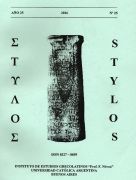Please use this identifier to cite or link to this item:
https://repositorio.uca.edu.ar/handle/123456789/4691| Título: | Los nombres parlantes en las traducciones de Plauto al español : el caso de Persa | Autor: | Vázquez, Romina L. | Palabras clave: | Plauto, ca. 254-184 a. C.; LITERATURA LATINA; TEATRO LATINO; COMEDIA; TRADUCCION; ANALISIS TEXTUAL | Fecha de publicación: | 2016 | Editorial: | Universidad Católica Argentina. Facultad de Filosofía y Letras. Instituto de estudios grecolatinos "Prof. F. Nóvoa" | Cita: | Vázquez, Romina L. “Los nombres parlantes en las traducciones de Plauto al español : el caso de Persa” [en línea]. Stylos, 25 (2016). Disponible en: https://repositorio.uca.edu.ar/handle/123456789/4691 | Resumen: | Resumen: Ya en el siglo IV, Donato (ad Ter. Ad. v. 26), se refiere a la relación que los nombres propios en la comedia guardan con ciertas características de los personajes que los llevan. En el último siglo, diversos estudiosos se han dedicado a analizar dicha relación y el papel central que los nombres parlantes juegan en la comicidad plautina. En este sentido, constituyen un elemento sumamente importante en cada una de las piezas y, por tanto, fundamental en el trabajo del traductor. Sin embargo, este problema suele ser soslayado en las traducciones al español, ya que los nombres aparecen, en su mayoría, castellanizados. En el presente trabajo, analizaremos cómo se vierten los nombres parlantes en distintas traducciones de Persa, los criterios seguidos en cada caso y sus implicancias en la traducción como producto textual. Abstract: As early as the fourth century, Donatus (ad Ter. Ad. v. 26.) refers to the relationship between proper names in comedy and features of characters. In the last century, many scholars have focused on analyzing such a relationship and the central role of speaking names in Plautine humor. In this regard, they constitute an extremely important element of the plays and therefore they are central to the translator’s work. However, this problem is often overlooked in translations to Spanish, since the names are not mostly translated, but they are adapted to a Spanish form of the Latin word. This paper proposes to study how speaking names are rendered in different translations of Persa, the criteria adopted and its implications for translation as a product. |
URI: | https://repositorio.uca.edu.ar/handle/123456789/4691 | ISSN: | 0327-8859 | Disciplina: | LITERATURA | Derechos: | Acceso Abierto | Fuente: | Stylos Nº 25, 2016 |
| Appears in Collections: | STY - 2016 nro. 25 |
Files in This Item:
| File | Description | Size | Format | |
|---|---|---|---|---|
| nombres-parlantes-traducciones-plauto.pdf | 301,82 kB | Adobe PDF |  View/Open |
Page view(s)
452
checked on Apr 30, 2024
Download(s)
530
checked on Apr 30, 2024
Google ScholarTM
Check
This item is licensed under a Creative Commons License

